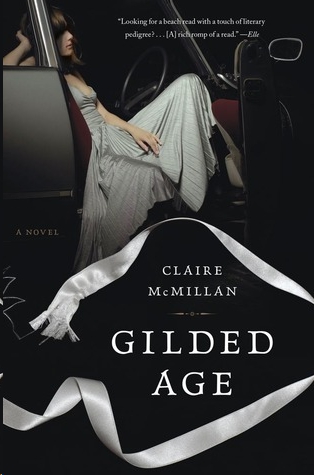
Gilded Age
A Novel
کتاب های مرتبط
- اطلاعات
- نقد و بررسی
- دیدگاه کاربران
نقد و بررسی

April 2, 2012
McMillan’s debut novel, inspired by Edith Wharton’s House of Mirth, is a hard-edged look at the vacuous, insipid elite of modern-day Cleveland, Ohio. Ellie Hart, back home after rehab and divorce, quickly falls into her old ways, charming men in her search for a wealthy husband, and alienating women. She hooks up with old friend William Selden, who seems more substantial than Ellie’s shallow “friends.” But when Ellie’s divorce settlement disappears in a Ponzi scheme, and her wild ways send Selden away, her desperation leads her to the ambitious, social-climbing Leforte and the comforts of his “enfolding luxury.” While the novel tips its hat to House of Mirth, a simple comparison doesn’t do McMillan justice. Her choice of alternating narration—from first-person (in the form of a childhood friend) to third, rather than wholly omniscient—allows the reader to get to know the increasingly unlikable narrator, a woman trying to absolve herself of guilt over her friend’s downfall. It’s hard to feel sympathy for Ellie, whose desire for acceptance makes learning from her mistakes unlikely. Here is a group of people who waste their resources playing a meaningless game of social comeuppance. McMillan’s characters may lack the complexity of Wharton’s, but she has a sharp eye when it comes to their weaknesses. Agent: Elizabeth Kaplan.

June 15, 2012
McMillan debuts with a present-day retelling of Edith Wharton's House of Mirth set in Cleveland, Ohio, Wharton's hometown. Who knew the longtime symbol of Rust Belt decline is still home to a thriving, social upper class composed of old-money families and the nouveau riche? Despite a little partaking of marijuana, even the city's young elite come across here as slightly anachronistic--the unnamed narrator refers to Betty Crocker and Phyllis Schlafly, and it's hard to accept that her arch tone, brittle but not quite witty, belongs to a young woman of the 21st century. She is expecting her first child with her genial husband, Jim, a lawyer originally from the south but preppy enough to be accepted by Cleveland blue bloods. Ellie Hart returns to this gossipy, incestuous world from New York City after a nasty divorce and a stay in a rehab facility. Beautiful, glamorous and broke, she is hoping to use her cache and connections to find a new husband. The narrator witnesses Ellie's escapades with a mixture of sympathy, jealousy and alarm. Initially Ellie seems to deserve jealousy as men flock toward her. But Ellie, a mix of mercenary man-eater and romantic innocent, is also self-destructive. She blows her chances with a pompous aristocrat, refuses to play the game with a coarse business tycoon, and invests what money she has unwisely. Her real attachment is to William Selden, a professor of romance literature, who is more conventional than he appears. As Ellie's schemes flounder, the tone darkens from brittle comedy of manners to cautionary anti-drug tragedy. The narrator's domestic happiness is briefly threatened, but her bourgeois domesticity stands in superior contrast to Ellie's ruin. While pitying Ellie, the narrator blames her downward spiral squarely on her poor choices. Readers will likely blame William, who has been both a corrupter and a coward. While Wharton fans will have fun comparing and contrasting the plots and characters, McMillan's version is a cartoonish echo of the classic.
COPYRIGHT(2012) Kirkus Reviews, ALL RIGHTS RESERVED.

May 1, 2012
McMillan's debut weaves Edith Wharton's The House of Mirth into modern-day Cleveland's preeminent Shaker Heights, where wealthy families have old roots and tightly knit, occasionally toxic, social circles. Ellie Hart comes back to Cleveland fresh from a failed marriage and a stint in rehab. Except for her beauty, she has few resources with which to support herself. Her friend, an unnamed narrator, recommends that she remarry immediately, but as Ellie bounces among wealthy men, she always returns to Selden, the professor she truly loves. But he, ultimately, will not have her, and this leads to Ellie's undoing. VERDICT McMillan cleverly uses Wharton's classic novel to draw parallels between the social mores of two starkly different centuries. While at times the characters' viewpoints on sex and gender roles seem jarring and antiquated, this is an honest, if cynical, critique of feminist progress. An engrossing first novel that will appeal to readers of Sheila Kohler and Susan Rebecca White. [See Prepub Alert, 12/19/11.]--Mara Dabrishus, Ursuline Coll. Lib., Pepper Pike, OH
Copyright 2012 Library Journal, LLC Used with permission.

May 1, 2012
Edith Wharton moves to Cleveland in this contemporary retelling of The House of Mirth. Chapters alternately follow a nameless socialite, whose new family is threatened by the return of Eleanor Ellie Hart, and Ellie's struggles with men, money, and sobriety. The competition for Ellie is fierce. Suitors include a married man, a wealthy but unsuitable lawyer, and Selden, a childhood friend turned English professor. Despite her increasing desperation, when she is given the chance to marry for money, Ellie cannot give up on love. The one area in which the updated setting fails is at the core of Ellie's dilemma. Surely, in the twenty-first century, even the oldest moneyed families would not frown on their daughters working for a living. In addition, even the voice of the nameless friend, who is now scandalized, now titillated by Ellie's behavior, does not quite make the reader believe that working for a living is an edgy concept. Nonetheless, the characters are interesting enough to keep the pages turning, even though we know how it ends for Ellie. This first novel would make a good book-group pairing with the original.(Reprinted with permission of Booklist, copyright 2012, American Library Association.)

























دیدگاه کاربران